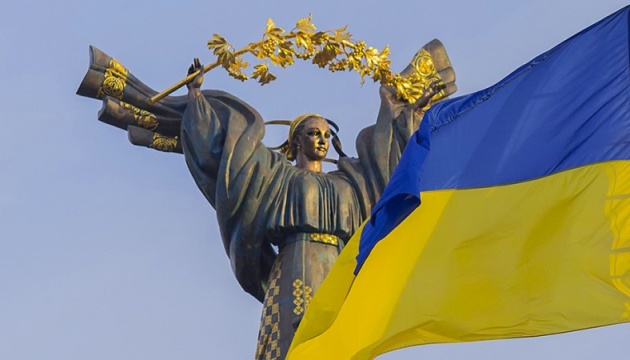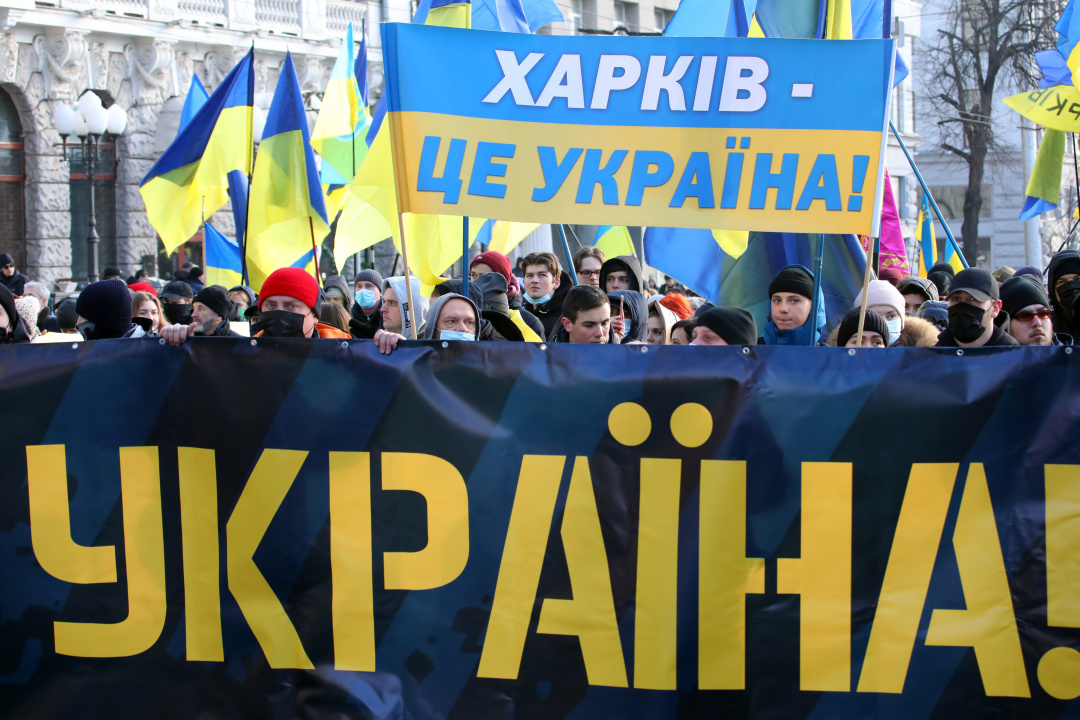
Russian war engine failure: What’s going on in Ukraine
This article is an editorial, aiming to convey to the Western audiences, including journalists, what’s on the mind of the Ukrainian people these days, why they have no fear, and what is the main motivation driving the nation
In the wide range of feelings experienced by Western journalists deployed in Ukraine in these troubled days is confusion. After all, Europe froze at the sound of Russian war drums. The feed keeps bringing alarming news on Russian tanks, artillery and Iskander missile systems amassed along the Ukrainian border. The U.S. State Department even announced a possible date of Russian invasion, while experienced Israel, along with a dozen other nations, is urgently evacuating diplomats from the country. Yet, there’s no apparent war fear in Ukraine – much to everyone’s surprise.
All institutions, government agencies, boutiques, beauty shops, and theaters continue to operate as usual. The country’s capital Kyiv, along with other major cities, remains vibrant and lives a normal life with children going to school, businesses and offices remaining open to clients, no one taping their windows in anticipation of bombing or digging trenches in the suburbs to “meet” Russian tanks.
People keep their calm, running errands, while, of course, discussing the latest tensions over a coffee in a brasserie or in front of their TVs at home, watching instead of a football match a flow of worrying news: “De-escalation talks have failed,” “The Russians pull fuel tanks and field hospitals closer to Ukraine’s border,” “Russian invasion is imminent,” and the like.

"I was at the Unity March (in Kyiv on Feb 12 - ed.) where I saw many Western journalists. They looked at us as if we’re some aliens," a correspondent with one of Kyiv's major outlets shares her reflections on Facebook. In fact, there are now thousands of such posts across social media these days.
In fact, the topic of this calm seen in the Ukrainian people has become no less important in the Western media than Russia's military movements. Some western journalists perceive our population as "fatalists," which is plain wrong. In fact, there is nothing "heroic", "fatalistic" or even unusual in such human behavior. The reason behind it is quite simple – Russia has been waging war against Ukraine for eight years already. These are the eight years of daily reports of deadly shelling, IDPs, and casualties among our military and civilians.
These are the eight years of hate, tonnes of information dirt and Russian malign narratives being shamelessly poured onto the Ukrainians from the Internet and local pro-Russian TV channels – generally unrestricted. After, all, this is the unfortunate downside of democracy and freedom of speech for which Ukrainians have fought for so long…
These are the eight years of a rather superficial attitude on the part of the West to this largely "forgotten" war… “Where is Ukraine anyway?” many in Europe and beyond must have been asking themselves, unwilling to get out of their comfort zone and stress out over a conflict they thought would never concern them almost directly...
Meanwhile, our Western colleagues would mostly very kindly and patiently listen to our stories about this war as we were trying to convey to them a simple idea – what’s happening in Ukraine is no internal conflict as Russia is trying to portray. This has nothing to do with internal civil confrontation, we would repeat again, and again. This is, in fact, a clash of worlds, with Ukraine defending up in arms the European values in which it chose to believe. And today, Ukrainians keep defending the very values that are now, unfortunately, being questioned and eroded in some European capitals.
The Ukrainian message, however, would often fall on deaf ears across Europe as some suggested that the western audiences might have hard time telling between the “two sorts of propaganda,” thus drawing parallel lines between Ukrainian reporting and Russian misinformation…
Before our eyes, history proves the fallacy of this attitude. The latest moves by Russia are threatening a new major war on the European continent. This time, Russia’s unequivocal threats are targeting more nations than just Ukraine. In fact, the Kremlin’s ultimatum has addressed the entire West, demanding that they renounce the European values and the very foundations of European security on which the whole democratic world stands.
The "Great West" seems to have noticed this Russian "argument," realized the level of threat, and finally started to react. The emotional tsunami that has now swept across most Western media over Russia's belligerent preparations is very well known to Ukrainians as we observed the developments unfold in 2014, when a shocker came with the Russian "little green men" insidiously stabbing the "fraternal nation" in the back. After the Crimea grab, the Russians unleashed a brutal massacre in eastern Ukraine’s Donbas, employing tanks, howitzers, and anti-aircraft systems that the Russian propaganda pundits outrageously claimed were purchased in local “gun shops” and manned by local “farmers.”
So this pretty much answers the question of where Ukrainians get this peace of mind in the face of the threat of "imminent" aggression. Our people have had their fair share of “scare.” The people of Ukraine had already lived through all that anxiety and fear now being experienced by many Europeans (more than half of whom are convinced that a new war in Europe is not only possible but also imminent). So what comes as a shock to Europeans today is something Ukrainians have gotten used to as the war here has been simmering for years.
Our Agency has been in the whirlpool of tragic events since the onset of this war. It took the life ouf our reporter Oleh Zadoianchuk, who joined the Army ranks on without hesitation. "If I hide behind the monitor, someone else will be drafted," he said before being deployed to the east of the country. He died on the night of September 4, 2014, just a week after being sworn in. It’s important to know that Oleh was killed in his unit’s tent camp, which came under an unprovoked attack of the Russian Tornado MLR systems which insidiously fired from across the border. When killing Ukrainian soldiers, the Russians were well aware Ukraine would not return fire to the Russian territory…
Ukrinform is just one of the many media families that lost their loved ones to this brutal war. Those of us who remained in the job just continued to do what they know best, often out there on the front line.
So we know exactly where this tranquility stems from. The war, which has been going on for so many years now, has affected almost every family. It changed the entire society. The notorious "Russian world" that came to the occupied territories of Donbas and Crimea is precisely what has shaped in our minds a calm and firm conviction that we need to employ all means to fight for our own freedom, to the end. Ukraine will never return to the Russian stable.
That is why, instead of panicking, our engineers, teachers, retirees, students – almost all population strata – are getting enrolled in territorial defense units, which even raises some eyebrows at the draft stations where clerks say they have never done so much paperwork. This all clearly points to a simple truth: if Russian soldiers invade Ukraine again, they will have to walk through fire.
According to the latest polls run, including with the participation of Western agencies, about 70 percent of Ukraine's population is ready to defend Ukraine, with about half of the male respondents saying they will take up arms to this end. There are currently nearly 350,000 combat-hardened military reservists, who are ready to return to their bases at the first call. Ukrainians are prepared.
This is all you need to know to understand what’s happening in Ukraine at the moment. The people are calm because they have long made their choice. The country will fight for a certain set of vital values, which are as strong in Kyiv as they are in Brussels, Prague, or Washington.
It is important to remember that Ukrainians will fight Russian autocracy, whether the West hints at NATO or EU membership prospects or delicately waters them down. Anyway, the Ukrainians support their nation’s accession to the said organizations, as reflected in the Constitution.
Amid the pressing treat, even these pivotal ideas on bloc affiliations seem secondary. What Ukrainians are ready to fight for with one of the world’s most powerful armies is for their opportunity to set their own path, for having this long-sought freedom of choice. It’s for the freedom people want to enjoy in their own territory. It’s that simple. Just imagine our people’s motivation.
Russians are also aware of how motivated the Ukrainians are. Operatives with their army’s general staff are aware, and so are the average Russians who keep in touch with their Ukrainian relatives. There’s no wavering in Ukraine. Rather than tremble, the Ukrainians stand united in the face of the threat. "Ukraine will resist" is now the most popular meme across social networks in Ukraine. Also, an important and reassuring message to the nation is being spread including through big boards: Ukraine’s Army will keep you safe. 4.5.0. (a military code for “all’s calm”).
Such calm determination on the part of Ukraine is the main deterrent against the Kremlin. This isn’t because the "Kremlin elders" changed their mind about Ukraine, forgetting about their hate – not at all. It’s just that they start realizing that their incursion would lead to a full-blown failure for them, with thousands of KIAs, an ensuing domestic political crisis, and a popular uprising on their own soil against the senseless killing of Russians in the war of aggression. We believe the Russians will immediately realize what the war will lead to once active hostilities burst out. Ukraine will not surrender, and the Russians, as our former "brothers," know exactly what this phrase means.
With the inevitable economic collapse under the pressure of “sanctions from hell” that the West has assured Russia will face should it opt for a new round of aggression against Ukraine, a “victorious blitz,” as some hawkish Kremlin minds imagine it, would turn into a catastrophe for Russia. This, in fact, would be the final episode of the historical drama “The Fall of the Empire.”
We are grateful to our Western colleagues, especially to the informants. It is they, that is, you - news agencies, pass through an avalanche of information, and convey the most important things to people and entire nations. This is especially significant given the massive flow of manipulative reports and outrageous disinformation circulated by Russia's government-operated media platforms that have unfortunately taken a deep root in the international media space, reaching out to the widest audiences across the globe thanks to ridiculously extensive funding – something Ukraine just can't afford. It’s only thanks to joint efforts with our western colleagues that we are able to debunk those many myths about Ukraine and the nature of the ongoing conflict and deliver the truth.
It is truly gratifying that at this critical moment, most of our foreign colleagues remain highly professional and restrained.
The thing is, the challenge we are facing is not about Ukraine, or rather, not only about Ukraine. Multiple signs prove that we are all dealing with a civilizational conflict, a clash between the democratic world with autocratic regimes, a struggle of light and dark, good and evil, if you wish Ukraine is only a small part of this much wider war theater. Since 2014, we had been trying to convey this assumption to Europe, albeit without much success. Now we have finally been heard. This gives us all hope for peace and our common future.
As for the war… Have no doubt. Ukraine will prevail. We won’t fail you.
